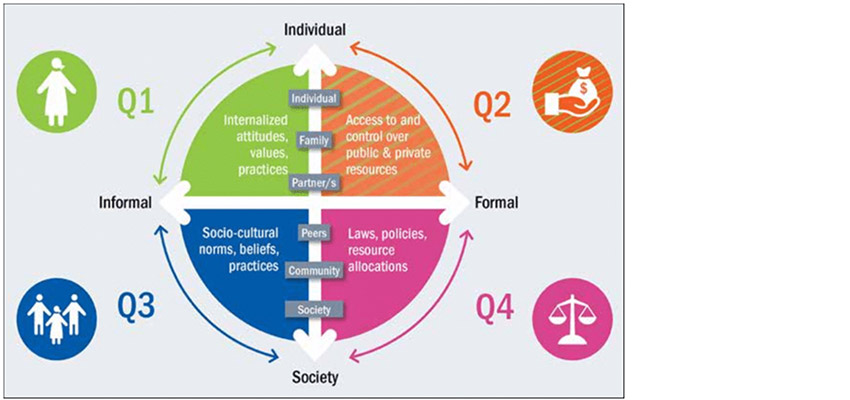
This is the first blog post of a two-part series. For part two, please click here.
What would an online training course look like if it were specifically designed to enhance women’s ability to succeed in a remote learning environment?
The global pandemic accelerated an already growing trend of people taking on-line learning programs, but not all remote learning environments are equal, and many courses do not have an integrated gender analysis that looks at how women engage in online learning. MIT D-lab’s Libby McDonald and Ta Corrales have just completed a two-year research study to determine the barriers and enablers for women in on-line learning through a USAID funded project. USAID commissioned MIT D-Lab to study an online coding bootcamp for women designed and implemented by Laboratoria, a non-profit launched in Peru in 2014 that expanded first to Mexico and Chile and later to Brazil and Colombia. Laboratoria’s online coding bootcamp has helped 2,800 women vault from lower wage jobs (52% did not have university degrees and 71% of admitted students reported they were not working prior to Laboratoria's bootcamp) into well paying jobs with better opportunities in the coding sector of the tech industry.
Focusing the study on a coding bootcamp provided an excellent panorama of the gendered barriers to online learning. Women training to enter the tech industry face a series of challenges ranging from lack of access to computers and the internet to balancing the demands of the training with their responsibility as care providers. Additional barriers include feelings of inadequacy, lack of mentors or role models, the demands of their traditional gendered roles, overall lack of confidence in their mastery of technical skills, and fear of failure in mixed educational settings.
Over the two-year study, D-Lab conducted 100 surveys; interviewed 44 students, 21 household members and 21 Laboratoria staff, and conducted a series of focus group discussions across students and alumni. They looked at bootcamp completion, job readiness, shifts in learning and well-being. They also analyzed barriers and enablers in six categories: gender roles and social norms, human capital and networks, psychological and emotional, physical, financial and program methods. The research found that Laboratoria’s online program was highly successful in providing women with a positive learning experience that went far beyond learning coding and moving into better paying jobs. The multi-faceted approach Laboratoria used to create enablers for women in the course and identify and address barriers to their learning appears to be rooted in a robust gender analysis.
A useful way to understand the importance of a holistic approach is through the Gender Matrix below. Developed by Aruna Roo and David Kelleher in 2002, the matrix divides the ways that gender impacts men and women into four main categories: internalized attitudes and practices; societal norms, beliefs, and practice; access to resources; and existing laws, policies and resource allocations.

Quadrant 2: Improving access and control over resources
Most efforts to make programs gender sensitive focus on quadrant two: improving women’s access to resources. These programs adjust training schedules to accommodate women’s responsibilities, provide computers and access to the internet, or offer childcare or transport allowances. At Laboratoria, women who demonstrate economic need can request a computer or help with accessing the internet. Laboratoria also has a fund to help women with other specific needs to help them continue the program. They provide copious online tools and resources for the participants and coaches for support. They have been diligent in considering how access to resources could be a barrier for women and have adapted the overall program to address those barriers.
Time is perhaps the key resource many women must consider as they undertake a new initiative. Laboratoria’s coding bootcamp is a self-directed learning program and the participants can move ahead at their own pace. Most participants emphasized the importance of remote learning in that it allowed them to complete the program, which, due to geography or other commitments, would have otherwise been impossible. Some women admitted that a remote training program can, however, be a double-edged sword as familial obligations and domestic chores can be distracting when they are at home all day. Women’s gendered responsibilities are deeply and structurally embedded in most societies. Though Laboratoria cannot change these gendered structures entirely, it addresses them by providing counseling to help women talk through challenges as well as practical training in time management. Laboratoria works with women in the program to draw up a weekly plan with a goal and tasks that is shared with the coaches so they can track progress and proactively reach out when they see that there are problems.
Despite the increased access to learning that self-directed remote programs can provide, the lack of in-person interaction can detract from building community and relationships, which are two things consistently rated as important to helping women thrive. Laboratoria deliberately invests considerable time throughout the program to create a climate of closeness, solidarity and camaraderie. They prioritize a series of activities that foster connection, support and friendship among the trainees. According to many participants, these activities really help balance out the physical separation of remote learning. Participants talked about how close they were to people in their cohort and how much the other participants helped them. “We have all cried and laughed together on-screen,” said one participant, explaining how this closeness reduced the isolation she might have felt sitting in front of the computer. The data clearly demonstrates that it is possible to interweave the convenience of remote training with effective community building and that it is a strong motivator and support for women in the program.
In short, Laboratoria pays attention to the gendered issues women might find in quadrant two. They provide access to intangible resources such as a supportive community as well as more tangible resources such as online learning resources, economic support when needed, help with laptops and internet connection as necessary, and the flexibility of self-directed learning which can help women deal with time constraints that arise due to other responsibilities.
Going beyond improving access and control over resources
Laboratoria’s program also actively addresses some of the more insidious gendered issues women can face in the Gender Matrix, especially those found in quadrant one, i.e., a sense of self, and quadrant three, i.e., societal gender norms. Laboratoria intentionally prepares women to go into an industry overwhelmingly dominated by men in which women do not see themselves reflected. Laboratoria sets up sessions with participants and aspiring participants to talk with women who have been through the program, as well as alumni currently working in tech who can be role models or mentors. Many women interviewed by D-Lab affirm that the Laboratoria program feels like a safe space to learn to code. Some emphasize that the women-only program protects them from sexism they would experience from men if the program were mixed.
The safe space for women that Laboratoria has created, is not simply the result of the absence of men. Men and women both experience relentless messaging about society’s expectations around gender roles, some of them damaging to self-esteem. These messages were reflected in the interviews D-Lab conducted with family members of the participants. The interviews with women participants themselves reveal how these negative messages and stereotypes become internalized. Families or members of their social circle might assume that men have a better propensity for tech work and that women have problems learning to code. The interviews also corroborate what many research studies such as Gender differences in self-perception accuracy: the confidence gap and women leaders’ under representation in academia (Tessie H.H. Herbst, SA Journal of Industrial Psychology) demonstrate that women tend to have more self-doubt and often express less confidence in their own abilities compared to men. Studies of the gender gap in business leadership are replete with anecdotes of how women entrepreneurs don’t have the same levels of confidence that men do – even when they are more qualified. For centuries, women were considered to have fewer abilities or less intelligence than men, particularly in technical fields. Given how deeply gender norms and stereotypes are entrenched in most societies in the world, it can be hard for women not to internalize these perceptions. Many of the women that Laboratoria is working with, especially those moving into a tech field for the first time, articulated the self-doubt and inadequacy they felt at the beginning of the program during the study’s interviews and focus group discussions.
Reviewing the data from D-Lab’s research study, it is striking to see how these less visible challenges can be as formidable to overcome as more tangible ones, such as a lack of access to a computer or inability to attend in-person classes. Laboratoria has zeroed in on this. They offer access to counseling, which, according to the data, was highly important and very helpful. For many women, it’s the first time they have access to this kind of support. The technical trainers provide strong affirmation of the women’s capacity and abilities. One participant said, “The coach told me she saw my potential, that is why I was chosen for this program, they believe I can do it.” Another said, “They fill us with confidence that we can do this.” The importance of this affirmation and emphasis on their potential is striking; the fact that a qualified person recognizes their ability seems to counter some of those persistent doubts. Laboratoria reinforces this with practical training in life skills helping women to learn how to deal with anxiety and stress, to understand themselves and to comprehend their strengths and areas where they need to work on improvement.
Finally, their teaching methodology is the most subversive way that Laboratoria’s program addresses women’s lack of confidence. Self-directed learning means that participants do not get taught to code in a class but must actively seek out the knowledge they need to solve a series of problems and projects. The responses from the participants change noticeably over the course of the bootcamp. The participants who were interviewed at the beginning of the program were focused on the challenges and difficulties they found in this particular learning methodology. Many women in this early stage expressed the need for more structured learning. However, many of the women who were interviewed closer to the end of the program or after they graduated, traced their growing confidence and abilities to the practice of self-directed learning despite the early difficulty they encountered. Through their andragogical approach, Laboratoria helps the women develop a growth mindset, which will enhance their learning now and in the future. The sequential experiences of taking on a very challenging training program, figuring out how to navigate learning, and then succeeding appears to be foundational to building confidence among the women in Laboratoria’s bootcamp.
The Gender Matrix is a helpful lens for understanding the different ways gender can have an impact on women’s ability to succeed in training programs. Barriers to accessing resources may be the most easily recognized challenges, but the findings of the study made clear the importance of understanding the ways in which societal norms and internalized perceptions have an impact on womens’ ability to persevere and succeed. Laboratoria’s thoughtful and holistic approach to crossing the different quadrants of the Gender Matrix provide a valuable model for helping women succeed in online training programs.
This is the first blog post of a two-part series. For part two, please click here.
About the author
Martha Thompson is a lecturer and Humanitarian Innovation program specialist at MIT D-Lab.
More information
MIT D-Lab Inclusive Economies Program
Contact
Libby McDonald, MIT D-Lab Lecturer and Inclusive Economies Program Lead

